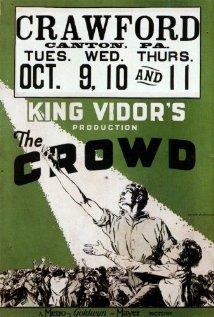
THE CROWD
US, 1928, 98 minutes, Black and white.
James Murray, Eleanor Boardman, Bert Roach, Estelle Clark, Lucy Beaumont.
Directed by King Vidor.
The Crowd was one of the finest silent films at MGM, quite outstanding in its technique, the quite spectacular with the times overhead views of New York City and the harbour, the impact of filming of the skyscrapers and the city streets, the lights at Coney island, much more sophisticated than many of the silent films and even the sound films in coming years. The film was directed by King Vidor, a significant director at MGM at this time, with such films as The Big Parade, a powerful film about World War I, and Proud Flesh. Vidor was to continue making films for another 30 years, some melodramas in the 1940s like Duel in the Son and, at the end of his career in the 1950s, the Henry Fonda – Audrey Hepburn version of War and Piece and the biblical Solomon and Sheba.
The film was also striking in its presentation of the American dream – that everyone could be president, but that practically no one becomes president. The film opens on 4 July 1900, with celebrations for independence, and the birth of the hero, John Sims. His father has ambitions, as does the son, going to work in a vast office (the desks in the space also strikingly filmed), an ordinary accountant. He goes on a date with a friend, enjoys the company of Mary, offers to marry her – though the friend does not give the marriage much chance of success – and they go on honeymoon to Niagara Falls (also strikingly filmed) but seem rather reticent about the consummation of the marriage. Nevertheless, they have a child, and then another.
But, cramped in their apartment, they get on each other’s nerves, squabble, he going out drinking one night when his wife’s family has come for dinner, she wanting to leave – but finally revealing that she is pregnant. He continues in his job, the friend is promoted, he gets a small raise in five years. Matters remain tense until he thinks up a slogan which is accepted and they get a cheque for $500 – he buying many gifts and the occasion for the death of one of their children, hurrying across the street for the gifts, who is run down.
John Sims quits his job, can’t hold any jobs, trying to sell vacuum cleaners but saying that everybody had bought one, his brothers-in-law, who do not like him, offering him a job – but his wife feels that she should stay and support him. His son is supportive, even as he contemplates suicide over a bridge on railway lines. Finally, he has to accept himself, taking a menial job, in a costume suit, juggling in the street to advertise – and he had previously made fun of someone in a similar situation.
This is an American Everyman film, impressive in its techniques, rather grim in its perspectives on the unreality and some of the hopelessness in the American dream.
1. Status of the film as a silent classic? In terms of techniques? In terms of subject and Everyman themes? The American Dream?
2. The black-and-white photography, the style, movement, characters and situations, visitors?
3. The opening, Independence Day 1900, a new century, new hopes? The birth of John Sims? His father’s ambitions?
4. The boy growing up, the boys sitting on the fence, black and white, ambitions and hopes?
5. The cards of the years passing, John in his 20s? His job and the office, the vast space with so many desks? Eyes on the clock? Getting out on time, Bert and the invitation to a night out, John and his studies, deciding to go, Jane and Mary, going to Coney island, the lights, the rides, the attraction? John deciding to marry Mary? The marriage – but Bert dubious?
6. The honeymoon at Niagara Falls, the awkwardness and reticence? The return home, the cramped apartment? The routine sitting in? The attitude of Mary’s mother, her brothers, hostile? The family coming to dinner, John going out, caught by Bert, staying out for the night, drinking?
7. Getting on each other’s nerves, John and not getting promotions, Bert getting promotion? Nagging at home? Mary wanting to leave? Packing? Explaining that she was pregnant? John and his change of attitude, his concern? The birth of their son, John going to the hospital, seeing the baby?
8. The passing of the years, the small raise, the birth of the daughter? The scene at the beach, irritability, his thinking up the slogan, sending it in, success, the cheque for $500, buying all the gifts?
9. The children on the street, hurrying for the gifts, the child being knocked down by the car, the onlookers, the doctor, the death of the child?
10. Tensions between husband and wife, discussions with Bert, no promotions, quitting his job, trying to get other jobs, staying only a few days, trying to sell vacuum cleaners, pushing amongst the men to get a job, Mary’s brothers and the offer of the job? Mary and her wanting to go, the child supporting John, his thoughts of suicide on the railway bridge?
11. Mary about to leave, her deciding that she should state to support John? His getting the job with juggling, in the cartoon suit – something he had ridiculed earlier?
12. The American Dream, realism, the hard life – and the film coming out just the year before the Wall Street crash?